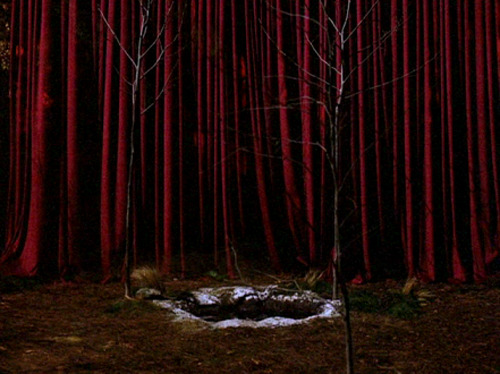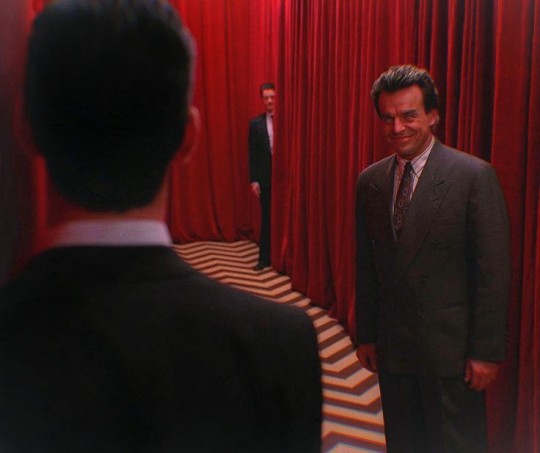Don't wanna be here? Send us removal request.
Text
The Curtain Call: performance and ‘reality’ on the Renaissance English stage and in the cinematic works of David Lynch
Attached is a link to my most recent blog post on the works of David Lynch, including Twin Peaks.
The Curtain Call: performance and ‘reality’ on the Renaissance English stage and in the cinematic works of David Lynch
The News Circuit
The Elizabethan (1558-1603) English theatre had a tradition called a 'jig' or an 'aftergame' in which, after the performance of a full-length play of any genre (but especially tragedy), a clown would perform. It's not considered an epilogue in that these plays usually don't contain any of the characters from the play spectators came to see, it's its own comic drama, like a palate cleanser. Some playwrights like Ben Jonson referenced these comic dramas in a metanarrative way.
Jonson's Volpone features a performing group of 'freaks' including a dwarf named Nano, who is asked (not seriously) to perform a jig for the protagonist. This reminds me of the Arm's jig in the Black Lodge and the metanarrative nature of the setting, the fact he's surrounded by red curtains and observed by a spectator (Coop).
This article is about stage performance and its parallels with reality, about Bakhtin and the carnivalesque, and the relationship between those concepts and the works of David Lynch.
Here's an excerpt:
Like Shakespeare’s Tempest, the works of David Lynch seem, whether through the actions or dialogue or the setting in which they take place or both, to be conscious of their performative nature. As a writer-director he appears interested in the concept of performance-within-performance, a metanarrative indication that the film is aware of its own performance, its fiction. Performance and spectatorship are principal to Lynch. In Twin Peaks, the Black Lodge is shrouded by tall red drapes identical to stage curtains. The only respite for Eraserhead’s protagonist is observing or being on stage with the Lady in the Radiator. Frank Booth’s victim in Blue Velvet is a professional singer at a nightclub; it’s her fame and stage presence which leads to her trouble with Frank in the first place. Mulholland Drive and Inland Empire, to different ends, are commentaries on the Hollywood filmmaking industry, and heavily feature scenes of sets and performance. Laura Palmer’s perfect schoolgirl life is performative. She performs to convince her family and friends she does not take drugs; she does not lead a second life in which she has fetishistic orgies with grown adults and know of a ring of groomed and trafficked teenage girls in and around Eastern Washington.
[...]
The world of Twin Peaks is upside-down, a mirror world. In it, Lynch and Frost have created an inverse world typical of the early modern era of English theatre. Shakespeare and his contemporaries created satirical worlds in their comedies in which their contemporary Elizabethan/Jacobean value system is reversed or altered. Social order is deconstructed by the early modern satirist and reorganised, offering spectators a mirror reality. In a Mark Fisher-esque, capitalist realist way, this type of spectatorship is purgative. It gives spectators a chance to revel in activities considered immoral and live vicariously through characters who might, for example, fool other characters that they are the opposite sex by dressing as such, or flirt with characters of the same sex, or decry God and Christianity, or party too hard and sin too much. It’s a Bacchanalian tradition, evocative of the Roman festival Saturnalia in which, for a single day, slaves pretended to be masters and masters slaves. It’s a catharsis and, almost paradoxically, reinforces ‘the rules’. In abandoning the rules on stage or in carnival, revellers can return to the real world cleansed of their antisocial desires, like Fisher suggests returning to the real world after observing a performance of revolution satisfies the urge to revolt. Bakhtin calls the literary equivalent of this, your Shakespeares and your Lynches, the carnival mode.
[...]
Bakhtin’s carnival symbolises the dismantling of structure and control. Normative order is replaced by strange and arguably immoral phenomena, contrary to the moral foundations of real contemporary society. Performance in Lynch’s work is symbolic of the abandonment of social order. Laura Palmer’s homecoming queen performance is offset by her other performance, the drug-abusing femme fatale type – in reality, she is neither.
Laura rejects order. She rejects the moral value system imposed on her. For Laura, so long as she is in control, even (or especially) if the act she is in control of is self-destructive, she is comfortable. Performance is her strength. Manipulation of both sides is her strength. She can manipulate her mother and her teachers and the pretty boys at school, and she can manipulate Jacques and Leo and the statutory rapists and child sex traffickers and paedophile truck drivers, and she can exercise some form of control over Bob.
Performance in the Black Lodge is the visual representation that this spiritual world exists outside of the rules of reality, it is through the looking glass, forget what you thought you knew.
[...]
For Lynch, all realities are performative, all performance is reality. What is real and what is performed roll into one. Social order is rejected and no one thing is truth: there are multiple truths, multiple realities, multiple potential reorganisations of the dismantled concept of contemporary social order.
#david lynch#dale cooper#laura palmer#fire walk with me#twin peaks#twin peaks: the return#twin peaks the return#mulholland drive#lost highway#blue velvet#inland empire#kyle maclachlan#laura dern#shakespeare#william shakespeare#the tempest#early modern english#renaissance#16th century#early modern history#early modern period#early modern theatre#theatre#literature#philosophy
5 notes
·
View notes
Text
“Truss wants this book to be a sort of alt-right manifesto, but typically falls short of the mark. It reads more like a memoir of her time in government since 2010; a Member of Parliament failing upwards in a party with an apparent death wish. She promises that this book is not a traditional political memoir, not simply a chance to justify every decision she made while in Westminster – but chapter after chapter, she does exactly that. She tells us the story of her career from beginning to end. Between the major crises of this Conservative era, Truss found herself time and again in political roles which she did not fully understand, attempting to implement ideas the self-evident ramifications of which she would not accept. This is an incompetent book about incompetence; a book about a lack of self-awareness which inherently lacks self-awareness.
“Across a meandering and ultimately pointless narrative, Truss describes times when her cunning socially conservative plans to fix Britain’s flaws were thwarted by progressives in ‘the establishment’. These anecdotes are occasionally underscored by the things she feels she did achieve in her ministerial tenures, including the badger cull, “the gassing of 5000 ducks,” and guaranteed trade access in Japan for British blue cheese exporters.”
https://tylercircuit.com/2024/08/10/truss-memoir/
#liz truss#conservatives#conservative party#uk#uk politics#labour#labour party#uk general election#british politics#prime minister#memoir#book review#blog
4 notes
·
View notes
Text










Rene Magritte, Memoirs of a Saint, 1970 /// Twin Peaks, 1991
Rene Magritte, La Belle de Nuit, 1940 /// Twin Peaks: Fire Walk With Me, 1992
Rene Magritte, The Pleasure Principle, 1937 /// Twin Peaks: The Return, 2017
Rene Magritte, The False Mirror, 1929 /// Twin Peaks, 1990
Rene Magritte, Image Not to Be Reproduced, 1937 /// Twin Peaks, 1991
12K notes
·
View notes
Photo

(via Who do you think this is there?: the fragmentation of Dale Cooper’s soul)
Having finished all of Twin Peaks at the weekend, above is the first of what I expect will be many pieces of writing about the final three parts and their impact on the show as a whole. Here, I discuss the pulverisation of Cooper’s selfhood, and the multitudes of ‘stories’ in Twin Peaks, figuratively and, as of the finale, literally.
#twin peaks#david lynch#mark frost#dale cooper#twin peaks: the return#blog#fire walk with me#agent cooper#laura palmer#diane evans#gordon cole#twin peaks the return#twin peaks 3#twin peaks season 3#twin peaks spoilers
4 notes
·
View notes